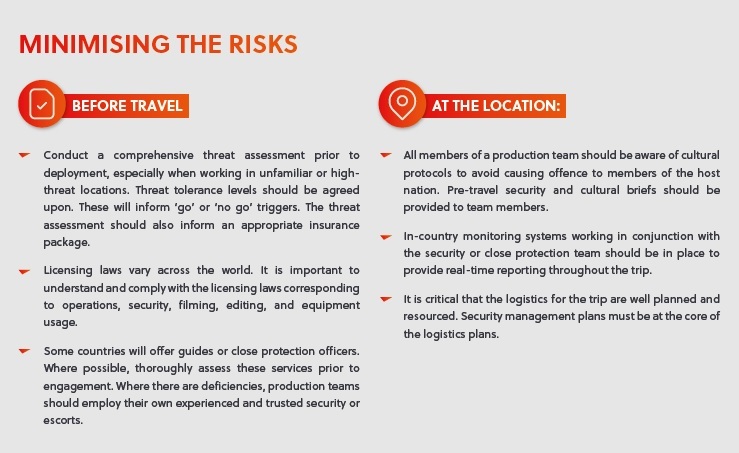Stealing the show: Security risks to film and media productions
Working in high-threat environments regardless of industry comes with its own challenges, but the nature of film and media productions coupled with the high profile of those involved can mean industry operators need to take additional precautions. A number of case studies from around the world highlight the various manifestations of security threats to the film and media industry.
ZIMBABWE
DETENTION: Failing to adhere to licensing or regulatory requirements can result in costly delays or even arrest. In July 2019, police arrested four filmmakers in Harare for allegedly contravening sections of the Censorship and Entertainment Act. The authorities allege that the filmmakers had not applied for a certificate from the Censorship and Entertainment Control Board, and that the contents of the film were unsuitable for distribution. The filmmakers, despite lacking the required certificate, had reportedly screened the film to a paying audience, which led to their arrest by the police.
UNITED STATES
ASSAULT: When film or media productions work on controversial topics, they can face hostility from local communities. On 29 June, two assailants attacked four LGBTQI filmmakers in Jackson Heights, New York City, who were shooting a documentary about anti- transgender violence. The assailants approached the filmmakers and began a verbal dispute, after which one of the perpetrators sprayed them with mace. Police charged one of the individuals with felony assault.
BAHAMAS / US
NATURAL DISASTER: News reporters in particular are exposed to the effects of the natural disasters they report on. In May 2018, two US journalists were killed while covering a storm in North Carolina, when a tree fell onto the car they were travelling in. In a more recent incident in September 2019, a television reporter and a photographer for a US network were dispatched to the Abaco Islands in the Bahamas, which ended up being in the direct path of hurricane Dorian. The journalists took cover in a hotel whose roof blew off in the high winds. While in this instance the journalists survived the storm unharmed, the incident highlights the risks of working in high-threat environments.
SOUTH AFRICA
VIOLENT CRIME: The open use of expensive equipment makes film crews attractive targets for criminals. In March 2019, the film crew of prominent local investigative journalism unit, Carte Blanche, were robbed at gunpoint in Johannesburg while filming on location for a story covering a new surveillance camera system. The new surveillance system was due to be rolled out as a citywide CCTV network offering ultra-high-definition video feeds to security companies and law-enforcement agencies. The suspects stole film equipment and fled the scene. The incident is one of many reported armed robberies targeting local film crews in South Africa. In July, a local news crew were robbed of film equipment and their personal belongings while filming on location in Khayelitsha, Cape Town, with a similar incident targeting the same crew in May. Local film crews are not the only ones targeted. In 2017, an international film crew were robbed by a gang while shooting at the popular Silvermine Nature Reserve in Cape Town, while in September this year, a popular UK-reality show stated it planned to cancel filming in Cape Town due to the country’s high crime rates.
CHINA
ASSAULT: The high profile of some film and media personnel can attract unwanted attention, and in extreme instances can lead to violent altercations. In July 2019, an assailant stabbed Hong Kong actor Simon Yam during a public event in southern China. The assailant, a 53-year-old man only identified by the surname Chen, rushed the stage and stabbed Yam in the stomach and cut his hand before being arrested by law enforcement personnel. Yam was evacuated to a nearby hospital and has since recovered from the attack. While specific details have not been disclosed regarding Chen’s motive, a police spokesperson said the suspect suffered from mental illness.

